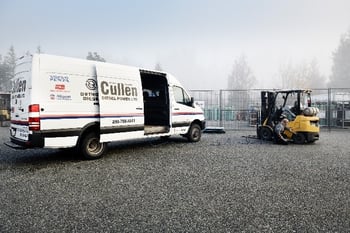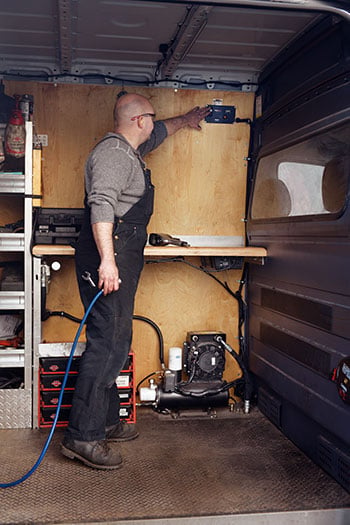Pros & Cons Of Commercial Service Vans
Commercial service vans have proven their place as mobile work vehicles, lending well to a variety of industries including mobile equipment repair, construction, and agriculture. It’s clear that service vans are here to stay but how do you know if they are right for your fleet?
There are several pros and cons to consider when evaluating service vans that can help with decision making. Let’s review the most commonly considered pros and cons.
 Pros of Service Vans
Pros of Service Vans
Vans provide the following benefits over trucks for a growing portion of the service vehicle market:
Tool Safety
An enclosed vehicle provides enhanced theft protection that a truck cannot. Concerns about material and tool safety can be quickly addressed by locking the van door instead of adding a lockable storage compartment, taking everything with you, or keeping a close eye on your vehicle while you grab lunch.
Weather Protection
Tools and equipment can be damaged by weather, and weather can make it more challenging to get work done. The enclosed space of a van is ideal for minimizing weather-related inconveniences and provides a dry space for a temporary escape.
Fuel Efficiency
Vans are typically better on gas and diesel than their traditional truck counterparts. If you don’t need to go off-roading to get to your jobs, a service van can be a great way to save at the pump.
 Cost
Cost
Vans typically cost less than trucks with service bodies, which is great for any budget. For example, Ford’s F550 Super Duty prices range from approximately $54,000 to $75,000 MSRP, plus the cost of a service body. Meanwhile, the Ford Transit ranges from $48,000 to $57,000 MSRP, and only needs to be upfitted with shelving.
Marketing Potential
Vans are a great billboard for any business and can be used to promote business services everywhere they go. Strategic vehicle designs are a great way to increase brand awareness and business opportunities. While trucks can also promote a business, their visibility is undeniably reduced.
Cons of Service Vans
A service van may not be the right choice for you in some circumstances. Some disadvantages of vans are as follows:
Power & Towing Capacity
Vans have less power and towing capacity than their truck counterparts, which can be an issue if you have large loads to haul, or if off-roading is required. In some cases, a service van simply can’t get the job done.
Smaller Cargo Size
Because of a van’s four walls, you cannot fit as much in a van as you can in a same-sized truck. Upfitters and equipment manufacturers understand this challenge and do build van-specific solutions, but cargo size is an extra consideration and even dealbreaker for some workers.
Operator Safety
Service vans also pose safety issue for workers that must be considered. For example, vans are not always a great choice for workers using equipment that’s heavy or powered by a secondary engine.
Heavy equipment can be challenging to move around the cargo area, especially if it is stored in an area that blocks access to other tools. While trucks can utilize cranes to quickly relocate heavy equipment, vans don’t have this option.
In addition, equipment with secondary engines like air compressors can result in toxic fume exposure. Fortunately, specialty equipment like the UNDERHOOD40 air compressor for vans can often eliminate these issues.
